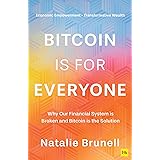The cryptocurrency world is constantly evolving, presenting both immense opportunities and complex challenges. In a recent AMA, featured in the video above, esteemed Bitcoin pioneer Roger Ver offered a profound dive into this dynamic landscape. His insights, drawn from nearly a decade of full-time immersion in digital assets, provide a compelling perspective for anyone navigating the intricate domain of cryptocurrency investment and technological innovation. The discussion covers everything from foundational economic principles to the practicalities of Bitcoin Cash adoption and the burgeoning world of decentralized finance, highlighting the ongoing pursuit of true financial freedom.
The Journey of a Crypto Pioneer: Roger Ver’s Genesis
Roger Ver, often recognized as the “Bitcoin Jesus,” has been a pivotal figure in the cryptocurrency movement since its nascent stages. Originating from Silicon Valley, California, Ver successfully established several businesses before encountering Bitcoin. He quickly recognized its revolutionary potential as one of the most impactful inventions in human history. Consequently, he strategically invested all his accrued capital into Bitcoin and a myriad of Bitcoin-centric startups, fundamentally shaping the early ecosystem.
Ver proudly recounts his position as the inaugural investor in the burgeoning crypto space, providing crucial seed funding for companies that have since become household names. This impressive portfolio includes industry giants such as Blockchain.com, Kraken, and BitPay. Furthermore, a lesser-known fact is his instrumental role in the inception of Ripple, where he supplied the initial seed capital. These early, calculated investments were made years before traditional venture capital firms acknowledged the sector, underscoring Ver’s foresight and unwavering belief in the technology.
His unwavering commitment stems from a profound conviction in the power of peer-to-peer electronic cash. This technology empowers individuals globally to send and receive money seamlessly, transcending geographical and institutional barriers without requiring permission from banks or governments. Such unhindered exchange is perceived as a catalyst for increased global trade, which, in turn, fuels significant economic growth. This growth ultimately elevates the quality of life for people worldwide, bringing a more prosperous future closer to realization.
Ver’s journey includes a noteworthy anecdote that illustrates his extreme dedication: in 2012, well before Bitcoin reached mainstream recognition, he sold one of his two Lamborghinis to acquire more Bitcoin. This decision, made when the digital asset was far less valuable, exemplifies the deep conviction that has guided his nearly decade-long involvement in the crypto space, underscoring his early and profound belief in its transformative capabilities.
Navigating Volatility: Crypto vs. Fiat and Portfolio Prudence
In today’s global economy, both traditional fiat currencies and rapidly evolving cryptocurrencies present unique risks to investors. Roger Ver pragmatically acknowledges the inherent volatility in both sectors, cautioning against a singular focus on either. Governments worldwide are engaging in unprecedented levels of money printing, a practice that fundamentally devalues fiat currencies and erodes purchasing power over time. This inflationary pressure makes holding large sums in traditional bank accounts increasingly risky, as the real value diminishes.
Conversely, the cryptocurrency market, while offering significant upside potential, is characterized by extreme price fluctuations. As Ver points out, veteran crypto enthusiasts are well aware of the dramatic rallies and steep corrections that define this market. Additionally, the digital landscape is not immune to security breaches, with exchanges susceptible to hacking attempts that can result in substantial financial losses. These inherent risks necessitate a thoughtful and balanced approach to asset allocation, promoting a diversified portfolio that mitigates exposure to any single asset class.
Determining the appropriate percentage of one’s net worth to allocate to cryptocurrencies is a nuanced decision, highly dependent on individual financial circumstances. For individuals with limited capital, perhaps only $100, advising a significant crypto investment might be imprudent due to the high-risk nature. Conversely, those possessing a substantial net worth are in a better position to allocate a larger portion to digital assets. This strategy allows them to capitalize on potential gains without jeopardizing their overall financial stability, ensuring that even if crypto investments were to entirely deprecate, their foundational nest egg remains secure. Therefore, a prudent investor will carefully assess their personal risk tolerance and financial capacity before committing to any investment strategy, particularly within the volatile crypto market.
Decentralized Finance (DeFi) Reshaping the Financial Landscape
The advent of Decentralized Finance, or DeFi, marks a transformative period in the global financial system, progressively challenging the traditional banking and lending models. While still in its nascent stages, DeFi clearly demonstrates a trajectory towards widespread adoption and disruptive innovation. Historically, large, centralized institutions held exclusive control over lending, credit assessment, and risk management, typically operating within specific geographic jurisdictions. DeFi, however, shatters these geographical and institutional barriers, enabling anyone globally to participate in lending and borrowing activities.
This permissionless nature is a cornerstone of DeFi, providing users with unparalleled control over their assets. Unlike traditional banking systems, DeFi accounts are resistant to being frozen or seized by external authorities, fostering a new era of financial autonomy. This powerful capability is not only gaining momentum but is expected to see increasing adoption and user engagement across the world, mirroring the growth trajectory of cryptocurrencies themselves. The application of DeFi extends far beyond lending, encompassing diverse sectors such as online e-commerce and direct content monetization, offering myriad possibilities for financial interaction.
For instance, content creators frequently encounter demonetization issues on platforms like YouTube. DeFi offers an alternative solution, allowing streamers and content creators to directly receive tips and payments from their audiences using cryptocurrencies, thereby bypassing traditional intermediaries. This paradigm shift towards direct, censorship-resistant transactions is facilitated by the underlying blockchain technology, which governments and regulators find exceedingly difficult to shut down. The innovation surge currently witnessed is largely attributed to these permissionless and censorship-resistant platforms, including Ethereum and Bitcoin Cash, which provide robust foundations for development.
The Peril of Custodial Platforms: Lessons from Cyprus
Despite the revolutionary potential of decentralized platforms, a critical vulnerability emerges if users are compelled to rely on custodial solutions. If transaction fees on a blockchain become prohibitively high, or for any other reason, individuals might opt for centralized custodians to hold their digital assets. This reliance, however, reintroduces the very risks that cryptocurrencies aim to circumvent. Roger Ver vividly recalls the financial crisis in Cyprus several years ago, where the government, facing severe economic distress, imposed an unprecedented 30% levy on all bank accounts. This drastic measure, which impacted numerous international depositors, including many Russian citizens, starkly illustrates the dangers of centralized control over financial assets.
Ver emphasizes that a similar scenario could plausibly unfold with major centralized cryptocurrency exchanges, such as Coinbase or Binance. Should governments face extreme fiscal challenges, they might compel these exchanges to surrender a portion of their customers’ digital assets. This potential vulnerability underscores a fundamental principle: if individuals cannot afford to transact directly on-chain using self-custodial wallets where they possess their private keys, they remain exposed to government intervention. Such reliance on intermediaries effectively negates the core benefits of decentralization and censorship resistance that blockchain technology promises.
In contrast, blockchains that offer fast, cheap, and reliable transactions empower users to maintain full control over their funds. When individuals hold their private keys, no government or centralized entity can arbitrarily confiscate their assets, as demonstrated by the Cyprus example. This inherent security and autonomy make cryptocurrencies that function effectively as peer-to-peer digital cash, enabling affordable on-chain transactions, significantly more resilient. Therefore, the ongoing development and adoption of such currencies are crucial for realizing the true vision of financial sovereignty, fostering a robust and secure ecosystem for digital asset management.
Scaling Solutions and Market Choices: Wrapped Bitcoin and Beyond
The cryptocurrency ecosystem is a testament to continuous innovation, particularly concerning scaling solutions and the unpredictable evolution of market adoption. A few years ago, significant enthusiasm surrounded the Lightning Network, lauded as a promising layer-two scaling solution for Bitcoin. Despite considerable hype and development, its practical adoption has been notably modest. In stark contrast, a data-driven comparison reveals that there is an estimated hundred to a thousand times more Bitcoin wrapped on Ethereum than currently active on the Lightning Network.
This substantial disparity clearly indicates that the market, through its collective user behavior, has demonstrated a preference for utilizing Ethereum as a scaling mechanism for Bitcoin over the Lightning Network. Such outcomes often surprise even the most astute observers, illustrating the inherent unpredictability of technological adoption in a free market. Another compelling example of this phenomenon is Purse.io, a platform initially conceived to allow credit card users to purchase Bitcoin at a premium by fulfilling Amazon orders for others.
However, upon its launch, the platform experienced an unexpected reversal of capital flow. Instead of users paying a premium for Bitcoin, an ecosystem rapidly developed where individuals with Amazon store credit were offering significant discounts to exchange their credit for cryptocurrencies on Purse.io. This unforeseen market dynamic resulted in users paying with Bitcoin to receive items at a discount, precisely the opposite of the founders’ initial expectations. These instances underscore a crucial insight: the ultimate utility and application of technologies like wrapped Bitcoin on Ethereum, Polkadot, or other platforms are often discovered through organic market interactions.
Innovators might conceptualize a particular use case, but the broader community frequently uncovers entirely novel applications that were unforeseen by the creators. This adaptability is the inherent beauty of the free market, where individuals consistently identify ingenious methods to achieve their objectives using the resources available to them. Consequently, the future of these scaling solutions and their specific applications remains an open canvas, continually shaped by user preferences and emergent needs within the dynamic blockchain landscape.
Roger Ver’s Top Picks: Spotlight on Bitcoin Cash and Ethereum’s Future
The expansive cryptocurrency ecosystem presents an overwhelming amount of innovation, making it challenging for any single individual to monitor every emerging project. Roger Ver candidly admits the difficulty of keeping pace with the sheer volume of developments across various platforms. His primary focus has been directed towards Bitcoin Cash, which he perceives as uniquely positioned to become the world’s leading permissionless digital cash. This commitment is underpinned by continuous advancements and a dedicated developer community, striving to enhance its utility as a global currency. While focusing on BCH, Ver also acknowledges other promising ventures, including AnyHedge on Bitcoin Cash, and various initiatives within the broader DeFi space like SushiSwap, recognizing the vibrant, multifaceted nature of the industry.
Bitcoin Cash: Roadmap to Enhanced Privacy and Utility
The roadmap for Bitcoin Cash includes several exciting developments aimed at bolstering its functionality, privacy, and user adoption. One of the most anticipated innovations is the Cash Fusion protocol, a sophisticated system designed to significantly enhance transactional privacy. This protocol shuffles a user’s Bitcoin Cash with others, employing diverse input and output values across multiple participants. The mathematical complexity ensures that the number of potential shuffling combinations within each round surpasses the estimated number of atoms in the entire universe, rendering transactions virtually untraceable. When combined with reusable payment codes, Cash Fusion positions Bitcoin Cash’s privacy capabilities on par with established privacy coins like Monero, which Ver also admires.
Despite Monero’s strong privacy features, it faces limitations in merchant acceptance. Bitcoin Cash, conversely, boasts widespread adoption, being accepted at over 100,000 websites and tens of thousands of physical stores globally. The Bitcoin.com wallet, serving more than 10 million users, is actively integrating the Cash Fusion protocol, which will dramatically expand private transaction capabilities for a vast user base. Furthermore, the Bitcoin Cash ecosystem already supports stablecoins, including USDT, with transactions costing less than a penny. This stands in stark contrast to Ethereum, where similar transactions can range from five to ten dollars, making BCH a highly cost-effective alternative for stablecoin usage and token ecosystems. In addition, local.bitcoin.com provides a non-custodial platform where users can buy and sell Bitcoin Cash using any payment method, in any country, without requiring KYC verification. This platform ensures end-to-end encrypted chat sessions and maintains user privacy, with Bitcoin.com never handling fiat or BCH directly, fostering true financial sovereignty. This powerful tool is gaining significant traction, with China notably being its largest market thus far.
Ethereum 2.0 and the Developer Powerhouse
The Ethereum network has faced considerable challenges, particularly concerning its escalating transaction fees, which can render small transactions economically unfeasible. This issue is a critical point of concern for users and developers alike, underscoring the pressing need for scalability improvements. Ethereum 2.0, now known as the Beacon Chain, represents a monumental upgrade designed to address these limitations through a shift to a Proof-of-Stake consensus mechanism and sharding. The recent achievement of its initial staking funding goal, reaching completion just hours before Ver’s discussion, marked a significant milestone, signaling strong community confidence in its future.
Roger Ver’s attendance at Devcon in Osaka approximately a year prior provided him with profound insights into Ethereum’s robust development ecosystem. He observed an unparalleled concentration of developer talent and intellectual capital dedicated to building on the Ethereum platform. This vibrant community, comprising many early Bitcoin proponents who recognized Ethereum’s potential, reinforced his already bullish stance on the network. The sheer volume of innovation and problem-solving efforts directed towards Ethereum’s future, particularly with the advancements brought by Ethereum 2.0, positions it as a powerhouse for smart contract development and decentralized applications. These ongoing efforts are poised to make Ethereum faster, cheaper, and more scalable, ultimately benefiting a broader user base.
Bitcoin vs. Bitcoin Cash: A Long-Term Perspective
Roger Ver expresses a tempered outlook on Bitcoin’s long-term prospects, suggesting that its recent price surges are often driven by speculative buying rather than fundamental utility. He argues that sophisticated investors typically enter a market before the general public, whereas current trends indicate many are buying Bitcoin simply because others are doing so. Objectively, a comparative analysis between Bitcoin and Bitcoin Cash reveals compelling distinctions in their practical applications and underlying value propositions.
Bitcoin Cash demonstrably offers faster, cheaper, and more reliable transactions than Bitcoin. Furthermore, it boasts an equivalent, if not greater, level of merchant acceptance globally. Despite these operational advantages, Bitcoin maintains a dominant market capitalization and widespread name recognition, which often leads to the mistaken perception of it being a safer investment. This branding strength, however, does not necessarily translate into superior utility as a peer-to-peer digital cash.
A notable disparity exists in the valuation between the two cryptocurrencies across different investment vehicles. On spot exchanges, Bitcoin trades at approximately 60 to 70 times the price of Bitcoin Cash. However, when examining institutional investment products, such as Grayscale’s offerings on the U.S. stock market, Bitcoin Cash trades at only about one-fifth the price of Bitcoin. This significant discrepancy suggests that institutional investors harbor a considerably more bullish long-term sentiment towards Bitcoin Cash. For developers and businesses looking to build on either platform, the choice becomes clear: Bitcoin Cash offers a more viable foundation due to its lower transaction costs, faster processing times, and greater reliability. Roger Ver has strategically invested in numerous businesses and projects that are leveraging Bitcoin Cash for token creation and other innovative applications, reinforcing his conviction in its future. Nevertheless, he advocates for a diversified portfolio, acknowledging the merits of holding various digital assets including Bitcoin, Ethereum, Dash, Monero, and Ripple.
The Ripple Debate: Centralization vs. Ecosystem Growth
Ripple (XRP) stands as a highly debated cryptocurrency, primarily due to concerns surrounding its perceived centralization. Critics often highlight that a significant portion—nearly half—of XRP’s total emission is held by the founding team or associated entities, a distribution model that contrasts sharply with the decentralized origins of Bitcoin. This concentration of ownership raises questions about its governance and susceptibility to centralized control, leading to considerable discussion within the blockchain community regarding the ideal level of decentralization for a digital asset.
Conversely, this centralized allocation provides Ripple with a substantial “war chest” – a multi-billion dollar reserve of XRP – which the company strategically deploys to fund ecosystem development and forge significant partnerships. Collaborations with established financial institutions, such as Western Union, demonstrate Ripple’s effectiveness in integrating digital assets into traditional financial frameworks. Roger Ver notes that despite the centralization critique, Ripple’s transactions are remarkably fast, cost-effective, and consistently reliable, attributes that are highly valued by users and businesses seeking efficient cross-border payments.
The long-term impact of these contrasting approaches—Bitcoin’s grassroots decentralization versus Ripple’s centralized, well-funded ecosystem—remains to be fully determined. Ver asserts that both models have their place and appeal to different segments of the market, cautioning against prematurely discounting either. Ripple continues to garner significant attention and interest from the public, indicating its sustained relevance within the diverse cryptocurrency landscape. The enduring debate surrounding Ripple underscores the multifaceted challenges and varying philosophies that define the ongoing evolution of decentralized and centralized financial technologies.
Securing Your Digital Assets: Wallets and Best Practices
The security of digital assets is paramount for every investor, leading to extensive discussions about the efficacy of various storage solutions. While hardware wallets are widely promoted for their robust offline security, Roger Ver highlights a more practical approach for daily transactions: utilizing his iPhone. He emphasizes that he uses cryptocurrencies primarily as a medium of exchange, making his mobile device the most convenient tool for sending, receiving, and conducting purchases. Ver notes that, to his knowledge, there are no documented instances of cryptocurrency being stolen from an unrooted or unjailbroken iPhone due to hacking, underscoring the inherent security provided by modern mobile operating systems for transactional purposes.
However, the conversation quickly shifts to the critical importance of secure seed phrase management. A co-host shared a cautionary tale, admitting to storing his seed phrase in iCloud Notes, which subsequently led to a security breach where hackers accessed his iCloud account. Although the hackers failed to seize his Ethereum Classic, this incident vividly illustrates the profound risks associated with storing critical recovery information on internet-connected or cloud-synced platforms. Such practices bypass the core security principles of self-custody and invite vulnerabilities that can be exploited by malicious actors. Therefore, the unequivocal recommendation remains: seed phrases should be recorded on physical paper and stored securely offline, detached from any digital device or cloud service. This method significantly minimizes exposure to online threats and cyber-attacks, reinforcing the fundamental tenet of personal responsibility in securing cryptocurrency holdings and ensuring true financial freedom.
Beyond Finance: Economic Literacy and Community Building
The adoption of Bitcoin Cash extends beyond mere transactions; it’s intricately linked to fostering economic literacy and building supportive communities. The island nation of Antigua serves as a compelling case study, demonstrating remarkable progress in cryptocurrency integration. With a population of approximately 90,000, Antigua now boasts roughly 50 businesses actively accepting Bitcoin Cash, an impressive penetration for a country of its size. Notably, one of the country’s ten gas stations, representing 10% of the total, has also begun accepting BCH, signaling a tangible shift towards digital currency adoption in everyday commerce.
In a significant initiative to promote economic understanding, Roger Ver is distributing copies of “Economics in One Lesson” by Henry Hazlitt to every high school student in Antigua, alongside some Bitcoin Cash. This foundational text, which profoundly influenced Ver’s own worldview, elucidates fundamental economic principles, illustrating how government intervention often leads to adverse outcomes and how fiat money printing devalues currency. The book champions the concept of voluntary interactions within a free market as the most effective means to foster prosperity and address societal needs. Ver recounts a personal anecdote where this book transformed a friend’s perspective from advocating government intervention to embracing libertarian principles, demonstrating its profound impact on promoting individual liberty and sound economic thought.
This initiative aims to cultivate a generation with a clearer understanding of economic realities, enabling them to make informed decisions about their financial futures and embrace tools like cryptocurrency. Beyond educational efforts, Bitcoin.com actively seeks talent to expand its global reach, particularly emphasizing grassroots efforts to evangelize digital assets. Opportunities for contributing to this mission, including roles that help educate new users about Bitcoin Cash and other digital currencies, can be found at jobs.bitcoin.com. The collective endeavor to promote cryptocurrency adoption and the principles of financial freedom continues to thrive through both technological innovation and a commitment to economic education, ensuring a more empowered global populace.







